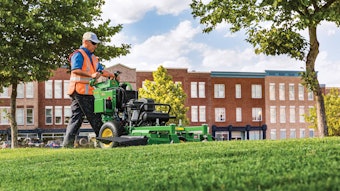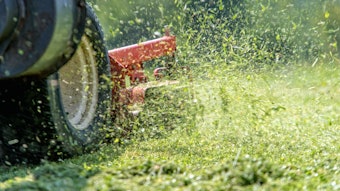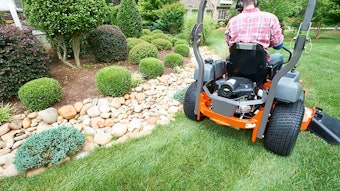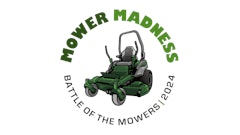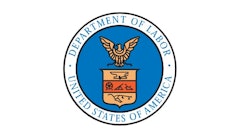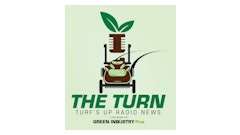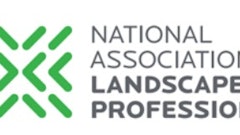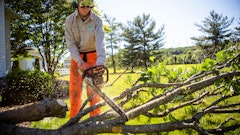
The challenges faced by landscaping companies during the COVID-19 pandemic are not easy. Green Industry Pros conducted a survey of industry companies the week of April 6 to learn how COVID-19 is impacting the industry from a business perspective.
A cross-section of 249 landscaping companies from 45 states responded to our survey about the impact of the pandemic.
From the response, it appears COVID-19 has touched companies of all sizes, ranging from 1-4 employees and less than $50,000 revenue up to the larger entities with 20+ employees and a sales volume of more than $5 million.
“This has been devastating to our company and the employees, we may go out of business due to the complete shutdown of our industry in Michigan,” said the manager of a Michigan landscaping company.
More than 50% of the respondents indicated that the pandemic had already impacted their revenue in some way and 11% noted no impact. Another 20% reported that it would start to have a substantial impact if it lasts another 30 days and the remainder suggesting the impact would be felt if the situation extended beyond the next 30 days.
Landscapers have endured recessions and economic downturns in the relatively recent past. It appears the length of the “stay-at-home” orders and the overall pandemic will ultimately determine the final impact on the green industry.
Is Landscaping Essential?
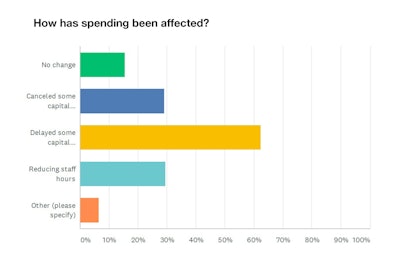
While the National Association of Landscape Professionals was successful in lobbying at the national level to get the U.S. Department of Homeland Security Cybersecurity & Infrastructure Security Agency’s list to include landscaping, the ultimate decision was still left to state governments to designate landscaping services as essential or not.
State governments were clearly concerned about the health and safety of their residents as the pandemic began. However, in attempting to designate industries or jobs as “essential” or “non-essential,” some officials gave no consideration to landscaping and lawn care specifically.
Based on the survey, depending on their locations, a vast majority, 81% of responding landscapers agree that landscaping and lawn care services should be labeled as essential. In addition, more than half of respondents, 55%, reported that their respective states have labeled them as being essential.
The remaining 40 percent was divided equally between being designated as non-essential or being permitted to maintain basic business operations, a definition which appears to vary by state.
“The governing question should be can we operate safely, not if we are essential,” a New York landscaper said. “The cure should not be worse than the virus. We should not be run out of business. Meanwhile there is a fear of losing work to those laid off who have no skills but start taking on cash jobs tending landscapes while on unemployment.”
Even for those able to operate but fearful of doing so with intent to help stop the spread have to be careful to not lose contracts or employees to those companies that are staying open.
“It’s a new reality for everyone,” added a Colorado-based landscaper. “Some states are taking a more aggressive stance primarily due to population density. The economy needs some people to work and outdoor workers are some of the lowest risk, so I think it makes sense to keep landscapers working and learn to monitor their safety practices.”
The state of Michigan has become a battleground for the “stay-at-home” orders and its impacts on landscaping businesses.
Contender’s Tree and Lawn Service owner Steve Martinko is among the Michigan residents taking the governor to federal court, alleging that the “stay-at-home” order and business closure has infringed on property and constitutional rights. They are not arguing the reason beyond the order, regarding health and safety, but the violations related to property rights.
“Michigan’s governor is bankrupting our industry needlessly,” noted one of the Michigan-based survey respondents.
Another Michigan landscaper added “It’s not OK that Mrs. Smith can go mow her lawn, but we cannot. We can easily send crews out in one-man teams. Our governor is going to crush our green industry in Michigan because of politics.”
Not all Michigan landscapers are opposed to the order as it currently stands.
“I feel the word essential should be emphasized on saving lives,” one respondent stated. “While there is stuff that we could definitely be doing in the landscape industry right now, without proper caution and practices we are going to help the spread not help save lives.”
Currently the Michigan order is slated to remain in effect through April 30. It remains to be seen what impact the lawsuit may have.
Cost of Doing Business
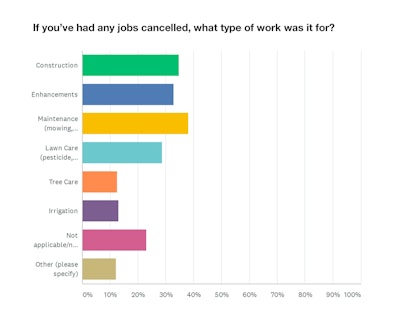
Lawn care companies appear to be fairing the best with only 28% of respondents reporting cancellations or delays in such service.
For construction, enhancements, and landscape maintenance, at least 35% were reporting cancelations, service reductions or postponements by their clients.
Of those that reported cancellations, 60% indicated that it was within the residential sector. Commercial work also has been impacted for about 35% of the companies responding to the survey. Beyond that, it was a combination of the restaurants/retail, resort/hotel style work for around 28 percent of respondents.
Across all job segments, 22% of respondents reported having no cancellations or delays.
For those with cancelled service or jobs, the top reason listed was financial concerns, at 58%, followed by COVID-19 at 53%.
With cancellations, comes less revenue and subsequently less spending.
Mirroring the cancellations, 60% of respondents indicated they have delayed some capital spending to adjust to the reduced revenue coming in.
Nearly 30 percent of respondents indicated cancellation of some capital spending or reducing of staff hours.
Some of the changes being made to businesses to accommodate COVID-19 included rescoping of services, staff cuts and 5% even acknowledged considering selling their companies.
Other than reducing capital spending, the other most popular option was to consider a business loan, which 56% of respondents were exploring.
Staffing During COVID-19
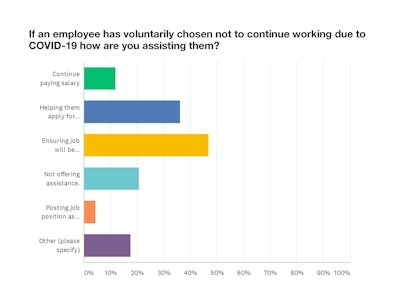
Combined with COVID-19 issues and the CARES Act, the hiring process became even more difficult.
As approved by Congress from an unemployment benefits perspective, the CARES Act allows eligible workers to receive an extra $600 per week on top of their state unemployment benefits.
For example, if a worker makes $1,100 in New York, they would be eligible for the state maximum unemployment benefit of $504 per week. With the revised plan, the worker would be eligible for an additional $600 of federal pandemic unemployment compensation, for a total of $1,104, replacing their original paycheck.
As a result, most landscape industry companies are finding it harder than normal to hire workers this year.
Approximately 35% of respondents reported that some employees had voluntarily chosen not to work due to concerns about COVID-19. Some owners believe the additional $600 in federal unemployment is causing people to quit and stay home.
For those impacted by a lay-off, furlough or volunteering not to work, 47% of the companies that filled out the Green Industry Pros survey said they were making effort to ensure that employees would still have a job upon the end of the pandemic. Also, 36% were assisting those same employees file for unemployment. A smaller number, 11%, were even continuing to pay salaries of those not working.
On the opposite end of the spectrum, based primarily on being in states where landscaping is considered essential, 20% of respondents who have lost employees are not offering any assistance and another 4% are even posting the open position.
Safety First
For those able to continue operating during the pandemic, there have been adjustments to the overall flow of work. Even while maintaining operations, most businesses have engaged in some additional safety precautions for both staff and customers.
Over half of the companies, 55%, reported that they have increased cleaning at their facilities to address concerns about COVID-19.
Additional adjustments for approximately 33% of respondents included having less crew members on job sites, allowing staff to work remotely and canceling some projects.
More than 25% of the companies reported having staggered work hours to minimize contact and permitting crew members to commute directly to job sites.


